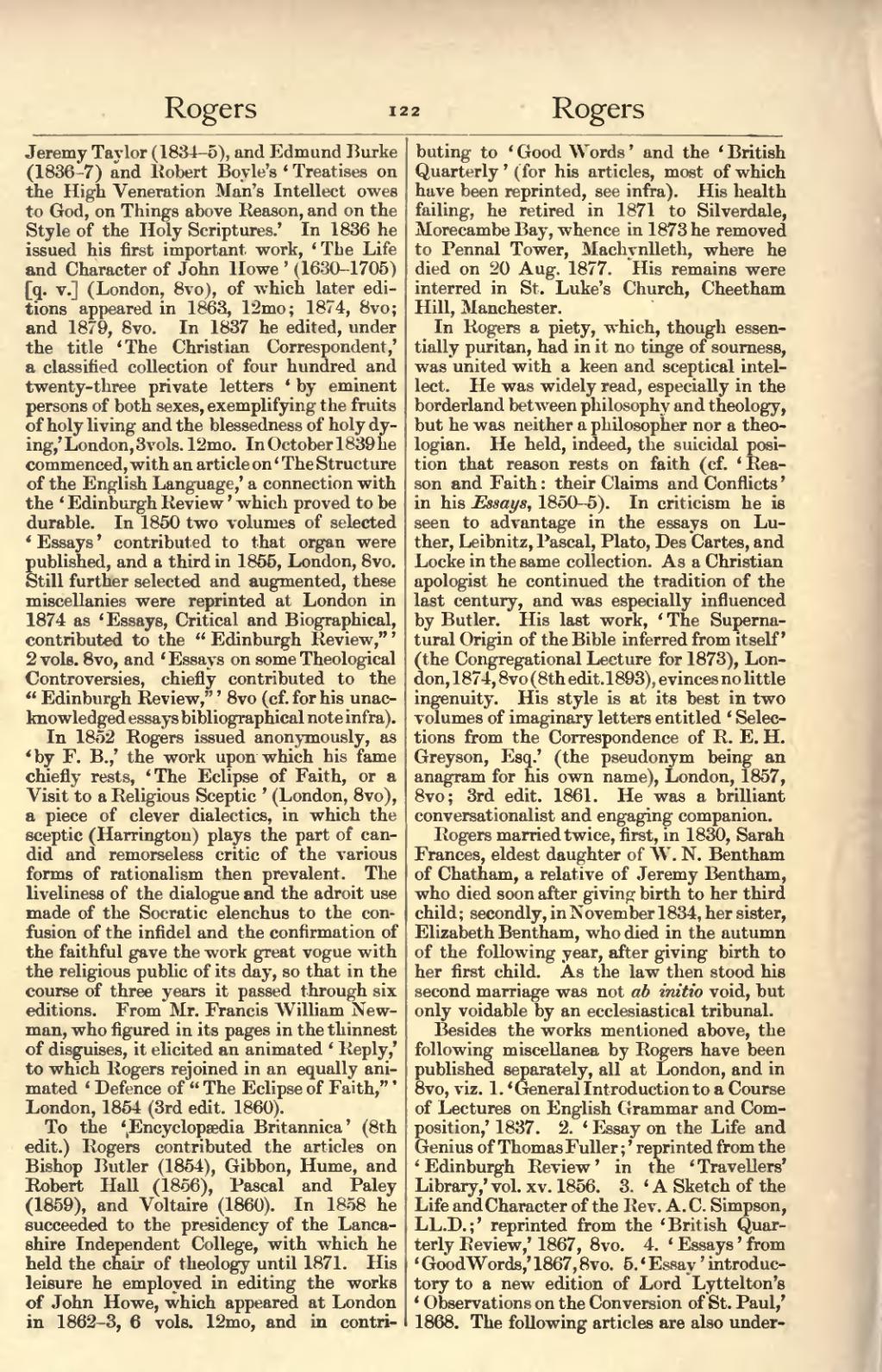Jeremy Taylor (1834–5), and Edmund Burke (1836–7) and Robert Boyle's ‘Treatises on the High Veneration Man's Intellect owes to God, on Things above Reason, and on the Style of the Holy Scriptures.’ In 1836 he issued his first important work, ‘The Life and Character of John Howe’ (1630–1705) [q. v.] (London, 8vo), of which later editions appeared in 1863, 12mo; 1874, 8vo; and 1879, 8vo. In 1837 he edited, under the title ‘The Christian Correspondent,’ a classified collection of four hundred and twenty-three private letters ‘by eminent persons of both sexes, exemplifying the fruits of holy living and the blessedness of holy dying,’ London, 3 vols. 12mo. In October 1839 he commenced, with an article on ‘The Structure of the English Language,’ a connection with the ‘Edinburgh Review’ which proved to be durable. In 1850 two volumes of selected ‘Essays’ contributed to that organ were published, and a third in 1855, London, 8vo. Still further selected and augmented, these miscellanies were reprinted at London in 1874 as ‘Essays, Critical and Biographical, contributed to the “Edinburgh Review,”’ 2 vols. 8vo, and ‘Essays on some Theological Controversies, chiefly contributed to the “Edinburgh Review,”’ 8vo (cf. for his unacknowledged essays bibliographical note infra).
In 1852 Rogers issued anonymously, as ‘by F. B.,’ the work upon which his fame chiefly rests, ‘The Eclipse of Faith, or a Visit to a Religious Sceptic’ (London, 8vo), a piece of clever dialectics, in which the sceptic (Harrington) plays the part of candid and remorseless critic of the various forms of rationalism then prevalent. The liveliness of the dialogue and the adroit use made of the Socratic elenchus to the confusion of the infidel and the confirmation of the faithful gave the work great vogue with the religious public of its day, so that in the course of three years it passed through six editions. From Mr. Francis William Newman, who figured in its pages in the thinnest of disguises, it elicited an animated ‘Reply,’ to which Rogers rejoined in an equally animated ‘Defence of “The Eclipse of Faith,”’ London, 1854 (3rd edit. 1860).
To the ‘Encyclopædia Britannica’ (8th edit.) Rogers contributed the articles on Bishop Butler (1854), Gibbon, Hume, and Robert Hall (1856), Pascal and Paley (1859), and Voltaire (1860). In 1858 he succeeded to the presidency of the Lancashire Independent College, with which he held the chair of theology until 1871. His leisure he employed in editing the works of John Howe, which appeared at London in 1862–3, 6 vols. 12mo, and in contributing to ‘Good Words’ and the ‘British Quarterly’ (for his articles, most of which have been reprinted, see infra). His health failing, he retired in 1871 to Silverdale, Morecambe Bay, whence in 1873 he removed to Pennal Tower, Machynlleth, where he died on 20 Aug. 1877. His remains were interred in St. Luke's Churchyard, Cheetham Hill, Manchester.
In Rogers a piety, which, though essentially puritan, had in it no tinge of sourness, was united with a keen and sceptical intellect. He was widely read, especially in the borderland between philosophy and theology, but he was neither a philosopher nor a theologian. In criticism he is seen to advantage in the essays on Luther, Leibnitz, Pascal, Plato, Des Cartes, and Locke in the same collection. As a Christian apologist he continued the tradition of the last century, and was especially influenced by Butler. His last work, ‘The Supernatural Origin of the Bible inferred from itself’ (the Congregational Lecture for 1873), London, 1874, 8vo (8th edit. 1893), evinces no little ingenuity. His style is at its best in two volumes of imaginary letters entitled ‘Selections from the Correspondence of R. E. H. Greyson, Esq.’ (the pseudonym being an anagram for his own name), London, 1857, 8vo; 3rd edit. 1861. He was a brilliant conversationalist and engaging companion.
Rogers married four times: first, in 1830, Sarah Frances, eldest daughter of W. N. Bentham of Chatham, a relative of Jeremy Bentham, who died soon after giving birth to her third child; secondly, in November 1834, her sister, Elizabeth, who died in the autumn of the following year, after giving birth to her first child. As the law then stood his second marriage was not ab initio void, but only voidable by an ecclesiastical tribunal. He married thirdly, in 1842, Emma, daughter of John Watson of Finsbury Square, London; she also died in giving birth to her first child, and Rogers married fourthly, in 1857, Jane, eldest daughter of Samuel Fletcher of Manchester. She died in 1891, having endowed scholarships in memory of her husband at the Lancashire Independent College and the Owens College, Manchester.
Besides the works mentioned above, Rogers published:
- ‘General Introduction to a Course of Lectures on English Grammar and Composition,’ 1837.
- ‘Essay on the Life and Genius of Thomas Fuller;’ reprinted from the ‘Edinburgh Review’ in the ‘Travellers' Library,’ vol. xv. 1856.
- ‘A Sketch of the Life and Character of the Rev. A. C. Simpson, LL.D.;’ reprinted from the ‘British Quarterly Review,’ 1867, 8vo.
- ‘Essays’ from ‘Good Words,’ 1867, 8vo.
- ‘Essay’ introductory to a new edition of Lord Lyttelton's ‘Observations on the Conversion of St. Paul,’ 1868.
The following articles are also under-
